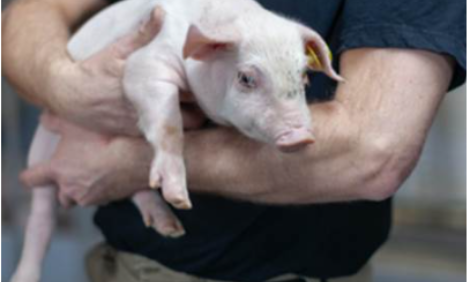



African swine fever - the virus prohibiting progress in West Africa's pig industry
Can African swine fever in West Africa be vaccinated against or cured? Currently, the answer is no, but current research holds great hope for future treatments.A pig farmer’s scourge
One of the reasons that pig farming is growing at such an exponential rate in Ghana, Nigeria and other Western African nations, is that the animals are so hardy. They are incredibly disease-resistant, except when it comes to African swine fever.
This disease is highly contagious in pigs, but is currently not a threat to human health. Pigs can contract it by coming into direct contact with an ASF-positive animal, any of its bodily fluids – blood, faeces, nasal or oral fluids – or any of its tissues, such as meat.
Indirect contact, where an animal contaminates an object and another animal picks up the disease by touching the object, is also possible. In these cases, the likeliest objects to be involved are farmers’ footwear, clothing, vehicles and other equipment involved in the husbandry or movement of the animals.
When African swine fever strikes, it strikes hard. Not only is it highly contagious, but due to its clinical representation it’s also predominantly fatal. Many cases where the entire herd was wiped out – a 100 percent mortality rate – have been reported. In West Africa, where swine farming is becoming increasingly important to the economy and the prosperity of individual households, the effects of this can be absolutely devastating.
No vaccine or cure
Due to the fact that ASF is one of the more common pig diseases, particularly in Western African countries, the development of an efficacious vaccine or cure would be critical to the growth of the pig industry in that region. For previous infectious disease outbreaks in pigs, vaccinations have been developed and, in some cases, gene editing has been used to breed disease-resistant pigs. Neither of these solutions have been successfully developed to combat ASF. Some animals, it is worth noting, can survive infection with less virulent isolates and continue to harbour the antibody, without excreting the virus or transmitting the virus to their offspring in utero.
The most effective solution for now
Without a vaccine or cure for ASF, the most effective method of control is to slaughter infected pigs, securely destroy their carcasses and disinfect the units and surrounding areas after the disease is confirmed. All swine that have been in contact with the virus must be traced, examined for signs of disease and then slaughtered if any are found.
ASF is a notifiable disease and the veterinary services in the affected country must assume responsibility for its control.
This is as true for countries in West Africa as for anywhere else in the world. Veterinary services for pork have improved considerably over the entire region, predominantly due to donations from the United Nations’ Food and Agricultural Organization (FAO).
Ghana received consumables and high-tech equipment, to the value of USD 70,000.00 from the FAO in 2019. The organisation has also provided aid to other countries, including Nigeria, The Gambia, Sierra Leone and Liberia.
Some of the most notable improvements are seen in the upgraded facilities at Ghana’s Accra Veterinary Laboratory (AVL). These state-of-the-art facilities are available for use by other countries in West Africa and contribute significantly to identifying and managing ASF and other infectious diseases.

The future of ASF research
The fight against African swine fever continues behind the scenes, with institutions all over the world conducting essential research to better our understanding of the ASF virus and develop effective treatments. The International Livestock Research Institute (ILRI) has been studying the virus since 2000. Their focus has been the disease epidemiology and its socio-economic impacts.
Interdisciplinary teams of scientists in different countries have worked with ministry staff and veterinary officers to gain insight and in-depth understanding of the way the virus spreads, its genetic diversity and its overall impact.
In 2004, the ILRI and the Chinese Academy of Agricultural Science (CAAS) jointly established a laboratory in Beijing. Here, they have been examining the genetic basis of resistance or tolerance to the ASF virus in both wild and locally adapted swine.
Ultimately, they have been supporting collaborative work on the diagnostic surveillance of ASF. Early identification is critical in controlling its spread across Western African states, and the AVL has also made important contributions here by identifying two ASF outbreaks in Ghana in their very early stages. As a result, the transmission was largely contained, and minimal numbers of animals were lost.
Over time, the number of partners working with the ILRI has increased and the Institute has committed itself to developing a vaccine. Scientists are actively working on a genome-based inoculation right now.
West Africa’s economic hope
Yielding more meat per kilogram than other common livestock species, and multiplying and growing incredibly quickly, pigs are the ideal road out of poverty for many individuals living in Western Africa right now.
Not only has extensive urbanisation meant that more citizens of West African states are consuming more pork products, but those regions are also catering to an increasing number of tourists who want to eat the meat.
An African swine fever cure, vaccination or both would allow the burgeoning pork industry in West Africa to reach its full potential and bring economic prosperity to the nations involved. With so much going into discovering these treatments, farmers are hoping it really is only a matter of time until they are found.









